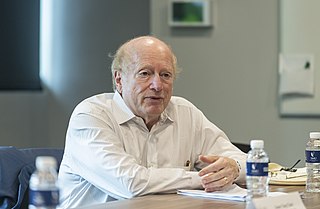Gary Peller | |
|---|---|
| Born | 1955 (age 66–67) |
| Era | 20th-/21st-century philosophy |
| Region | Western philosophy |
| School | Critical theory |
Main interests | Legal philosophy |
Notable ideas | Critical legal studies, critical race theory |
Influences | |
Gary Peller (born 1955) is Professor of Law at Georgetown University Law Center [2] and a prominent member of the critical legal studies and critical race theory movements. [3] [4]
Peller received a Bachelor of Arts degree from Emory University in 1977 and a Juris Doctor degree from Harvard Law School where he served as a member of the Harvard Law Review . [5] Peller then clerked for Morris Lasker, a judge of the United States District Court for the Southern District of New York. He is currently a member of the Maryland state bar.[ citation needed ]
Peller was one of the central figures at the Conference on Critical Legal Studies. With Kimberlé Crenshaw, Peller co-authored a widely cited article, "The Contradictions of Mainstream Constitutional Theory", published in the UCLA Law Review , and co-edited one of the standard texts in critical race theory. Peller is among the irrationalist branch of the critical legal studies movement, arguing that there is no neutral or objective rationality but rather what is understood as knowledge is a socially contingent result of prevailing power dynamics. [6] He is also known for his debate with Mark Tushnet where he defended the critical race theorists' use of personal narrative rather than conventional arguments in their articles. [7]
Critical legal studies (CLS) is a school of critical theory that developed in the United States during the 1970s. CLS adherents claim that laws are devised to maintain the status quo of society and thereby codify its biases against marginalized groups.

The Georgetown University Law Center is the law school of Georgetown University, a private research university in Washington, D.C. It was established in 1870 and is the second-largest law school in the United States by enrollment and the most applied to, receiving more full-time applications than any other law school in the country.
Feminist legal theory, also known as feminist jurisprudence, is based on the belief that the law has been fundamental in women's historical subordination. Feminist jurisprudence the philosophy of law is based on the political, economic, and social inequality of the sexes and feminist legal theory is the encompassment of law and theory connected.The project of feminist legal theory is twofold. First, feminist jurisprudence seeks to explain ways in which the law played a role in women's former subordinate status. Feminist legal theory was directly created to recognize and combat the legal system built primarily by the and for male intentions, often forgetting important components and experiences women and marginalized communities face. The law perpetuates a male valued system at the expense of female values. Through making sure all people have access to participate in legal systems as professionals to combating cases in constitutional and discriminatory law, feminist legal theory is utilized for it all.

Intersectionality is an analytical framework for understanding how aspects of a person's social and political identities combine to create different modes of discrimination and privilege. Intersectionality identifies multiple factors of advantage and disadvantage. Examples of these factors include gender, caste, sex, race, ethnicity, class, sexuality, religion, disability, weight, physical appearance, and height. These intersecting and overlapping social identities may be both empowering and oppressing.

Critical race theory (CRT) is a cross-disciplinary intellectual and social movement of civil-rights scholars and activists who seek to examine the intersection of race, society, and law in the United States and to challenge mainstream American liberal approaches to racial justice. The word critical in its name is an academic term that refers to critical thinking, critical theory, and scholarly criticism, rather than criticizing or blaming people. CRT is also used in sociology to explain social, political, and legal structures and power distribution through the lens of race. For example, the CRT conceptual framework is one way to study racial bias in laws and institutions, such as the how and why of incarceration rates and how sentencing differs among racial groups in the United States. It first arose in the 1970s, like other critical schools of thought, such as critical legal studies, which examines how legal rules protect the status quo.

Derrick Albert Bell Jr. was an American lawyer, professor, and civil rights activist.

Mark Victor Tushnet specializes in constitutional law and theory, including comparative constitutional law, and is currently the William Nelson Cromwell Professor of Law at Harvard Law School. Tushnet is identified with the critical legal studies movement.

Mari J. Matsuda is an American lawyer, activist, and law professor at the William S. Richardson School of Law at the University of Hawaii. She was the first tenured female Asian American law professor in the United States, at University of California, Los Angeles (UCLA) School of Law in 1998 and one of the leading voices in critical race theory since its inception. Matsuda returned to Richardson in the fall of 2008. Prior to her return, Matsuda was a professor at the UCLA School of Law and Georgetown University Law Center, specializing in the fields of torts, constitutional law, legal history, feminist theory, critical race theory, and civil rights law.

Kimberlé Williams Crenshaw is an American civil rights advocate and a leading scholar of critical race theory. She is a professor at the UCLA School of Law and Columbia Law School, where she specializes in race and gender issues.
Peter Gabel is an American law academic and associate editor of Tikkun, a bi-monthly Jewish critique of politics, culture, and society and has written a number of articles for the magazine on subjects ranging from the original intent of the framers of the Constitution to the creationism/evolution controversy. Gabel was a founder of the Institute for Labor and Mental Health in Oakland, California, and is close to the critical legal studies movement. He has published more than a dozen articles in law journals such as the Harvard Law Review and Texas Law Review, focusing on the role of law in shaping popular consciousness and on how law can best be used to bring about progressive social change.
Articles in social and political philosophy include:

William Nichol Eskridge Jr. is the John A. Garver Professor of Jurisprudence at Yale Law School. He is one of the most cited law professors in America, ranking fourth overall for the period 2016–2020. He writes primarily on constitutional law, legislation and statutory interpretation, religion, marriage equality, and LGBT rights.
Louis Michael Seidman is the Carmack Waterhouse Professor of Constitutional Law at Georgetown University Law Center in Washington, D.C., a widely read constitutional law scholar and major proponent of the critical legal studies movement. Seidman's 2012 work is On Constitutional Disobedience, where Seidman challenges the viability of political policy arguments made in reference to constitutional obligation.
The African American Policy Forum (AAPF) is a social justice think tank focused on issues of gender and diversity. AAPF seeks to build bridges between arts, activism, and the academy in order to address structural inequality and systemic oppression. AAPF develops and promotes frameworks and strategies that address a vision of racial justice that embraces the intersections of race, gender, class, and the array of barriers that disempower those who are marginalized in society.
Kendall Thomas is Nash Professor of Law, and Director of the Center for the Study of Law and Culture, at Columbia Law School.

Rebecca Tushnet is an American legal scholar. She serves as the Frank Stanton Professor of First Amendment Law at Harvard Law School. Her scholarship focuses on copyright, trademark, First Amendment, and false advertising.
Intersectionality is the interconnection of race, class, and gender among an individual or group. This is often related to an experience of discrimination or a disadvantage. This definition came from Kimberlé Crenshaw. Kimberlé Crenshaw, a feminist scholar, is widely known for coining the term intersection in her 1989 essay, which sheds light on the oppression black women have been exposed to, especially during the slavery period. Crenshaw's analogy of intersection to traffic flow explains, "Discrimination, like traffic through an intersection, may flow in one direction, and it may flow in another. If an accident happens in an intersection, it can be caused by cars traveling from any number of directions and, sometimes, from all of them. Similarly, if a Black woman is harmed because she is in the intersection, her injury could result from sex discrimination or race discrimination."
Queer of color critique is an intersectional framework, grounded in Black feminism, that challenges the single-issue approach to queer theory by analyzing how power dynamics associated race, class, gender expression, sexuality, ability, culture and nationality influence the lived experiences of individuals and groups that hold one or more of these identities. Incorporating the scholarship and writings of Audre Lorde, Gloria Anzaldúa, Kimberlé Crenshaw, Barbara Smith, Cathy Cohen, Brittney Cooper and Charlene A. Carruthers, the queer of color critique asks: what is queer about queer theory if we are analyzing sexuality as if it is removed from other identities? The queer of color critique expands queer politics and challenges queer activists to move out of a "single oppression framework" and incorporate the work and perspectives of differently marginalized identities into their politics, practices and organizations. The Combahee River Collective Statement clearly articulates the intersecting forces of power: "The most general statement of our politics at the present time would be that we are actively committed to struggling against racial, sexual, heterosexual, and class oppression, and see as our particular task the development of integrated analysis and practice based upon the fact that major systems of oppression are interlocking. The synthesis of these oppressions creates the conditions of our lives." Queer of color critique demands that an intersectional lens be applied queer politics and illustrates the limitations and contradictions of queer theory without it. Exercised by activists, organizers, intellectuals, care workers and community members alike, the queer of color critique imagines and builds a world in which all people can thrive as their most authentic selves- without sacrificing any part of their identity.

All the Women Are White, All the Blacks Are Men, But Some of Us Are Brave (1982) is a landmark feminist anthology in Black Women's Studies printed in numerous editions, co-edited by Akasha Gloria Hull, Patricia Bell-Scott, and Barbara Smith.
Abolitionist teaching, also known as abolitionist pedagogy, is practices and approaches to teaching that focus on restoring humanity for all children in schools. Abolitionist teaching is the practice of pursuing educational freedom for all students, eschewing reform in favor of transformation. This practice is rooted in Black critical theory and focused on joy, direct action and abolition.